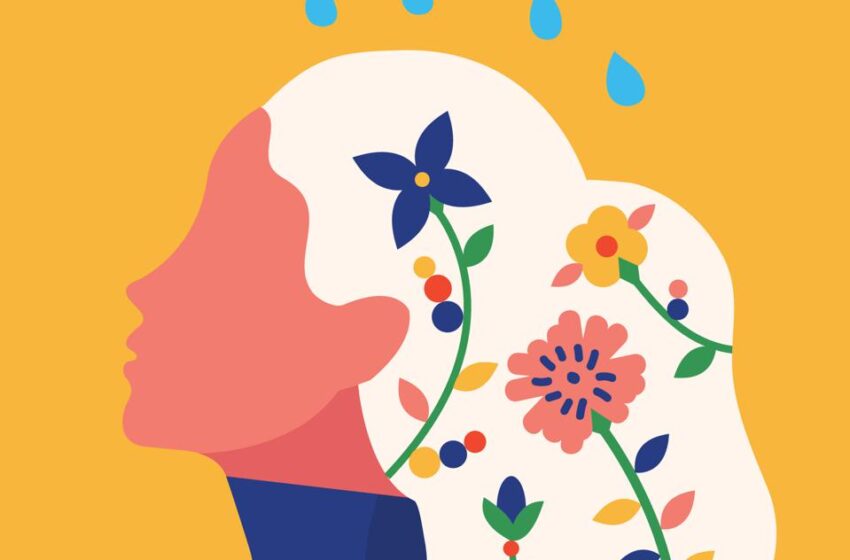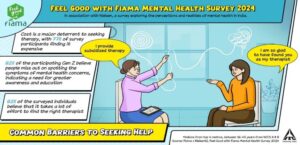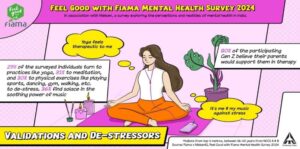MENTAL HEALTH ISSUES IMPACT HEALTH CONDITIONS NEGATIVELY: SURVEY

Team L&M
With mental health conversations gaining traction, ITC’s Feel Good With Fiama Mental Wellbeing Survey 2024 marks its 4th year by exploring the perceptions and realities of mental health in India. Commissioned with NielsenIQ, the survey unveils the awareness, attitude and behavioural landscape for mental wellbeing in India. It reflects progressiveness in acknowledging the need for mental wellbeing while also indicating the persistent barriers in accessing professional support.
While 83 per cent of the survey participants believe mental health issues are nothing to be ashamed of, 81 per cent feel ashamed of telling others that they are taking therapy. While we are becoming more accepting of mental health issues in general, the act of seeking help still carries a heavy weight of perceived societal judgment. This inherent fear of judgement prevents individuals from having open conversations about their mental well-being hindering access to support. Additionally, 83 per cent respondents believe that youth report experiencing more anxiety and fear of change than older generations, emphasizing the unique pressures faced by younger demographics.
This year’s survey also reveals 80 per cent of the participating Gen Z believe their parents would support them in therapy. There is a growing acceptance among close social circles and is a step towards normalizing mental health conversations.
Key findings of the survey:
- Cost is a barrier to therapy, with 77 per cent of surveyed individuals finding therapy expensive. In addition to this, 74 per cent do not go for therapy as health insurance does not cover mental health services.
- 55 per cent believe therapy is for the weak, highlighting the enduring stigma surrounding mental health support.
- 83 per cent respondents believe that youth report experiencing more anxiety and fear of change than older generations, emphasizing the unique pressures faced by younger demographics.
- 82 per cent of the surveyed individuals believe that it takes a lot of effort to find the right therapist.
- 82 per cent of the participating Gen Z believe people miss out on spotting the symptoms of mental health concerns, indicating a need for greater awareness and education.
- 69 per cent of the surveyed individuals feel issues with mental wellbeing negatively impacts their health condition.
Cost is a major deterrent to seeking therapy, with 77 per cent of survey participants finding it expensive. Virtual therapy is a more accessible and affordable alternative. Notably, among the surveyed individuals who are suffering or have family members suffering from mental health issues 52 per cent of the Gen Z are now open to online counselling, which is a significant increase from 36% last year, highlighting the growing comfort with digital solutions for mental health support. ITC Fiama, through its ‘Feel Good with Fiama’ initiative, in partnership with The Minds Foundation provides subsidized virtual therapy with qualified professionals making therapy more accessible and very affordable at INR 300/- per session.
“The Feel Good with Fiama initiative resonates deeply with our brand purpose,” said Sameer Satpathy, Divisional Chief Executive, Personal Care Products Business, ITC Limited. “We understand that the journey to mental well-being can be challenging, and sometimes even knowing where to start can feel overwhelming. This year’s survey revealed the many barriers to therapy like high cost, stigma, and difficulty in finding the right therapist. This insight fuels our commitment to making therapy more accessible and affordable through Fiama’s Virtual therapy Clinic in partnership with the Minds Foundation. It is encouraging to see the progressive attitude towards understanding, acknowledging, and addressing mental wellbeing.”
While professional help is crucial for addressing mental wellbeing, the survey also highlights the importance of incorporating healthy coping mechanisms into our daily lives. 29 per cent of the surveyed individuals turn to practices like yoga, 31 per cent to meditation, and 30 per centto physical exercises like playing sports, dancing, gym, walking, etc. to de-stress. 36 per cent find solace in the soothing power of music. ITC Fiama is working towards making mental wellbeing a priority by fostering a culture of openness and acceptance.




